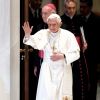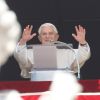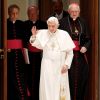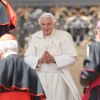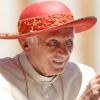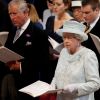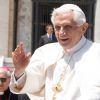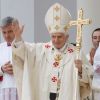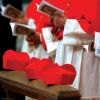VATICAN CITY - The international community must act swiftly and decisively to end the violence in Syria, which "risks becoming a widespread conflict that would have seriously negative consequences for the country and the entire region," Pope Benedict XVI said.
The Pope expressed his prayers and hopes for peace in Syria during a meeting June 21 with Catholic Church representatives from throughout the Middle East, including the nuncio to Syria and the president of Caritas Syria, and with leaders of Eastern Catholic churches.
The representatives and leaders were at the Vatican for a meeting of the Vatican's coordinating body for church funding agencies that assist Eastern Catholics and Catholics throughout the Middle East.
The violence in Syria began in March 2011 and has led to the deaths of thousands of civilians as soldiers battle forces seeking an end to the rule of President Bashar Assad.
VATICAN CITY - Expressing his "deep concern" about terrorist violence in Nigeria, Pope Benedict XVI urged an end to "the shedding of the blood of so many innocent people."
Speaking at the end of his weekly general audience June 20, the Pope said the terrorist attacks are continuing and are "directed mostly against Christian faithful."
For months, bombs have exploded at Christian churches in various cities; the attacks were carried out on Sunday mornings when the churches were full. Forty-five people were reported killed June 17 after four churches in Zaria and Kaduna were bombed, and mobs carried out reprisal attacks on Muslims.
VATICAN CITY - Catholics who act like their faith has nothing to do with daily life and a church structure that is more bureaucracy than service are two impediments to the church's ability to proclaim faith in Jesus, said the working document for the next world Synod of Bishops.
"Every one of the church's actions has an essential evangelizing character and must never be separated from the duty to help others encounter Christ in faith," said the document that will guide the work of the synod, scheduled for Oct. 7-28 at the Vatican.
Pope Benedict XVI chose as the synod's theme: "The New Evangelization for the Transmission of the Christian Faith."
VATICAN CITY - Pope Benedict XVI called for prayers for the 50th International Eucharistic Congress under way in Dublin, expressing hopes it would lead to a greater appreciation of Jesus' self-sacrifice and deeper love and unity in the church.
The weeklong gathering, which opened June 10, is "a precious occasion for reaffirming the centrality of the Eucharist in the life of the church," the Pope said at the end of his weekly general audience June 13.
ROME - A misunderstanding of the Second Vatican Council has led some Catholics to think that eucharistic adoration and Corpus Christi processions are pietistic practices that pale in importance to the celebration of Mass, Pope Benedict XVI said.
"A unilateral interpretation of the Second Vatican Council has penalized this dimension" of Catholic faith, which is to recognize Jesus truly present in the Eucharist and worthy of adoration, the Pope said June 7 during a Mass marking the feast of the Body and Blood of Christ.
VATICAN CITY - The demands of work can't bully people out of needed time off, Pope Benedict XVI said.
Sunday must be a day of rest for everyone, so people can be free to be with their families and with God, the Pope said.
"By defending Sunday, one defends human freedom," he said during his weekly general audience in St. Peter's Square June 6.
VATICAN CITY - In her 60-year reign, Britain's Queen Elizabeth II has offered the world an inspiring example of Christian leadership and dedication to duty, Pope Benedict XVI said in a message to the monarch.
Congratulating the queen on her diamond jubilee, the Pope said her reign demonstrated "a commitment to maintaining the principles of freedom, justice and democracy, in keeping with a noble vision of the role of a Christian monarch."
MILAN - As Pope Benedict XVI closed the World Meeting of Families in Italy's capital of finance and fashion, he opened the possibility of his heading to the United States when he named the Archdiocese of Philadelphia the next venue of the world gathering.
"God willing," he said, he would attend in 2015 as he greeted Archbishop Charles J. Chaput of Philadelphia and "the Catholics of that great city," saying he looked forward to meeting U.S. Catholics and other families from around the world there.
VATICAN CITY - Pope Benedict XVI voiced regret for the turmoil surrounding the recent publication of leaked Vatican documents, but thanked the vast majority of people who work at the Vatican for their dedication and fidelity.
Speaking at the end of his weekly general audience May 30, the pope said much of the media coverage of the leak of private letters and of the arrest May 23 of his personal assistant has been exaggerated and "completely gratuitous, and has gone far beyond the facts, offering an image of the Holy See that does not correspond to reality."
VATICAN CITY - The modern world is a latter-day Babel, where arrogance inspired by technological progress leads people to play God and sets them against each other, a predicament from which people can escape only through divinely inspired humility and love, said Pope Benedict XVI.
The pope made his remarks during his homily May 27, Pentecost Sunday, during Mass in St. Peter's Basilica.
VATICAN CITY - Pope Benedict XVI joined the international community in condemning a massacre in Syria, and he called for Christian and Muslim leaders in the country to guide their faithful in prayer and collaboration to restore peace and calm.
The massacre in Houla May 25-26 left about 108 people dead, including 49 children and 34 women. The U.N. Security Council May 27 condemned the massacre of civilians and, while not pinning all the blame on the Syrian government, it accused the government of inappropriately using heavy weapons in a residential area.
VATICAN CITY - Addressing God as "Father" is an acknowledgement that God is the one who created, supports and guides humanity, Pope Benedict XVI said.
"Maybe people today do not understand the beauty, greatness and deep consolation" that comes from recognizing God as father, "because the paternal figure is not sufficiently present today," the Pope said May 23 during his weekly general audience.
VATICAN CITY - In five speeches over a period of six months, Pope Benedict XVI warned visiting U.S. bishops of the threats that an increasingly secularized society poses to the Catholic Church in America, especially in the areas of religious liberty, sexual morality and the definition of marriage.
Yet the Pope did not advise that American Catholics withdraw from a largely hostile environment in order to preserve their values and faith. Instead, as part of his call for a new evangelization within the church and beyond, he urged believers to engage even more closely with wider society for the benefit of all Americans.
Winning hearts for the New Evangelization
Recently a new expression has made its way into our theological and ecclesial vocabulary. There’s a lot of talk today about the New Evangelization. Indeed the Pope has called for a Synod to meet this year for a month in Rome to try to articulate a vision and strategy for such an endeavour.
What is meant by New Evangelization? In simple terms: Millions of people, particularly in the Western world, are Christian in name, come from Christian backgrounds, are familiar with Christianity, believe that they know and understand Christianity, but no longer practise that faith in a meaningful way. They’ve heard of Christ and the Gospel, even though they may be overrating themselves in their belief that they know and understand what these mean. No matter. Whatever their shortcomings in understanding a faith they no longer practise, they believe that they’ve already been evangelized and that their non-practise is an examined decision. Their attitude toward Christianity, in essence, is: I know what it is. I’ve tried it. And it’s not for me!
VATICAN CITY - "We are on the Lord's team, the winning team," Pope Benedict XVI told members of the College of Cardinals at the end of a luncheon he hosted to thank them for their friendship and support.
At the end of the meal in the frescoed Sala Ducale of the Apostolic Palace May 21, the Pope told the Cardinals that St. Augustine once described history as "a battle between two loves," love for oneself and love for God.



